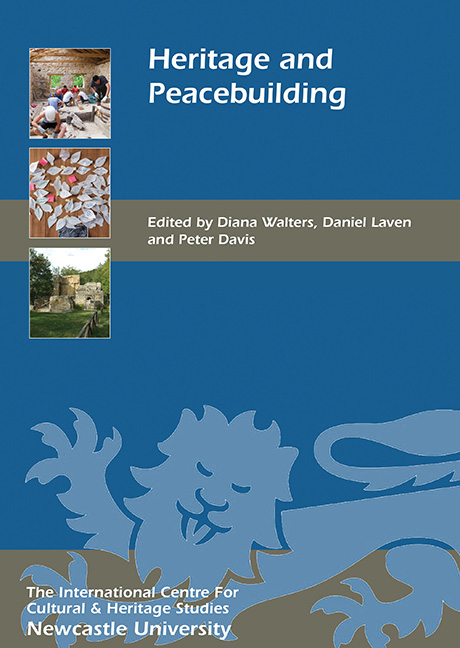Book contents
- Frontmatter
- Contents
- List of illustrations
- Acknowledgements
- List of abbreviations
- Preface
- Introduction
- NEW AND EMERGING IDEAS AROUND HERITAGE AND PEACE
- HERITAGE AND PEACEBUILDING IN PRACTICE
- HERITAGE, PEACEBUILDING AND SITES
- 14 A Conversation with Yongtanit Pimonsathean: Managing Conflict in Thailand
- 15 Challenging the Roots of Prejudice: the Monte Sole Case Study
- 16 Mau Mau: the Divisive Heritage of Liberation Struggle in Kenya
- 17 The Heritage of Geopolitical Borders as Peace Tourism Attractions
- 18 Rebuilding the Broken: Regional Restoration Camps as a Meeting Platform in the Western Balkans
- 19 Conflict or Reconciliation? Industrial Heritage Practices at a Turning Point
- 20 A Conversation with Saleem Ali: Environmental Challenges and Conflict Resolution
- List of Contributors
- Index
- Previous Titles
16 - Mau Mau: the Divisive Heritage of Liberation Struggle in Kenya
from HERITAGE, PEACEBUILDING AND SITES
Published online by Cambridge University Press: 16 February 2018
- Frontmatter
- Contents
- List of illustrations
- Acknowledgements
- List of abbreviations
- Preface
- Introduction
- NEW AND EMERGING IDEAS AROUND HERITAGE AND PEACE
- HERITAGE AND PEACEBUILDING IN PRACTICE
- HERITAGE, PEACEBUILDING AND SITES
- 14 A Conversation with Yongtanit Pimonsathean: Managing Conflict in Thailand
- 15 Challenging the Roots of Prejudice: the Monte Sole Case Study
- 16 Mau Mau: the Divisive Heritage of Liberation Struggle in Kenya
- 17 The Heritage of Geopolitical Borders as Peace Tourism Attractions
- 18 Rebuilding the Broken: Regional Restoration Camps as a Meeting Platform in the Western Balkans
- 19 Conflict or Reconciliation? Industrial Heritage Practices at a Turning Point
- 20 A Conversation with Saleem Ali: Environmental Challenges and Conflict Resolution
- List of Contributors
- Index
- Previous Titles
Summary
The turbulent Mau Mau anti-colonial rebellion of the 1950s in Kenya has cast a long shadow over Kenya to the present day. Though it failed militarily, it is generally agreed that Mau Mau helped pave the way for independence in 1963. Mau Mau was the name the British colonial government gave to both the movement and the conflict; the name was rejected by its members, who called themselves the Kenya Land Freedom Army. Mau Mau was contested at the time, and its legacy remains contested for reasons this chapter will explain. The shadow that falls on contemporary Kenya is evident not only socially and politically but also in the heritage sector wherever Mau Mau heritage, history and memory manifests. This includes State-led heritage initiatives, civil society engagement with history and heritage, expressions of heritage and memory by a variety of actors (State and non-State), heritage-related tourism, transitional justice processes and certain peace and reconciliation initiatives. Coombes et al (2014, 230) state that: ‘The conflict in which Mau Mau took part is being fought all over again in the twenty-first century, not in the forests of the Aberdares [where much of the fighting took place in the 1950s] but on the heritage stage at national and local level.’ This is partly because not everyone agrees with the official ‘story of Mau Mau’ (as told in State museum spaces and school textbooks, for example), not least the ex-fighters themselves, who complain that the ‘true story’ has been forgotten and requires rewriting (Hughes 2011a). The struggle for control over the heritage and memorialisation of Mau Mau continues unabated, since it still has enormous social and political currency. The ‘struggle to shape Mau Mau memory’ began well before independence, steered by imperial propagandists who damned Mau Mau as barbaric (Hughes 2011a, 185, quoting Clough 2003, 254); Mau Mau counter-attacked in this early propaganda war (Osborne 2015). Today, amid struggles by war veterans and their families seeking compensation from the British government for human rights abuses in the 1950s, and internecine struggles between veterans who constantly question each other's authenticity as genuine ex-Mau Mau, the issue has also become commodified and the legacy further complicated.
- Type
- Chapter
- Information
- Heritage and Peacebuilding , pp. 179 - 190Publisher: Boydell & BrewerPrint publication year: 2017

